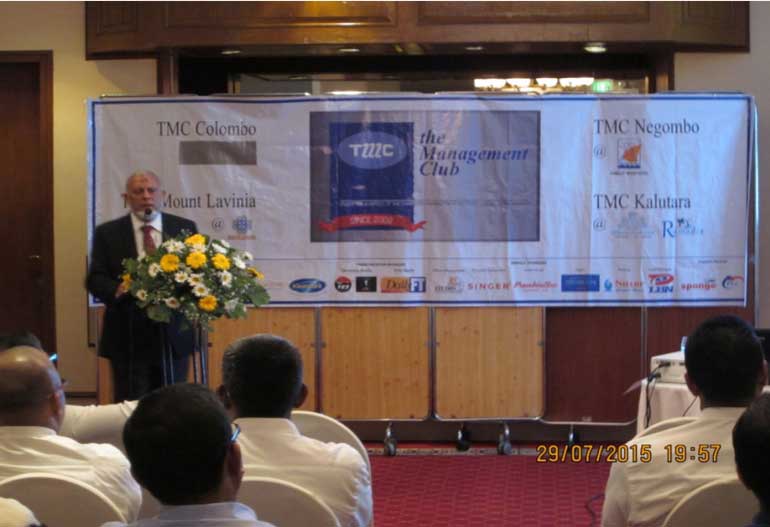Tuesday Feb 17, 2026
Tuesday Feb 17, 2026
Monday, 24 August 2015 00:00 - - {{hitsCtrl.values.hits}}

Fazal Issadeen was the Guest Speaker for The Management Club Meeting which was held on 29 July. He delivered a very different and thought provoking lecture on the most important asset we possess – ‘Intelligence’. The focus however was on the aspect of utilising ‘Intelligence in Business’ and geared to the members of TMC.
Describing IQ, EQ & XQ as the fundamental components of intelligence, he went on to say that IQ had two aspects: one quantitative and the other qualitative. Possessing quantitative IQ is a clear indication of mathematical and logical skills and this is a core ingredient that every employee we recruit must have.
EQ (Emotional Quotient) is an indicator of personal competence, self-awareness, self confidence, self-management, optimism, social competence, empathy, relationship management and inspirational leadership. These skills are needed by team leaders and above to manage Human Resources effectively by creating passion and ownership thus optimising each employee’s contribution to the organisation.
XQ (Execution Quotient) is the ability to get things done, to be disciplined and organised and the ability to identify priorities. Every employee must be given a KPI that can measure his XQ for an organisation to effectively function.
IQ, EQ and XQ can be developed in the early stages of our life. For example a child who lacks math skills can develop math abilities using KUMON as a training tool. EQ and XQ can be developed very effectively in our Secondary School level by participating in team sports and organising school events etc. Parents who fast track their kids’ education ignoring the precious two years we spend at Advance Level actually deprive their children of developing EQ and XQ. On a personal note Fazal mentioned that they stopped recruiting employees who have not completed 12 years of schooling as they have been consistently immature, lacking EQ. As Hilary Clinton says, “If you bungle raising your kids, I don’t think whatever else you do matters very much.”
Top universities globally, focus on developing the students’ thinking skills rather than only academic skills. Not surprising that our local universities are ranked 2,000 and above globally.
On the subject of ‘Intelligence in planning ahead’, Fazal described his work experience in 1975 with Professor Senaka Bibile who was the Chairman at State Pharmaceuticals Corp.
Prof. Bibile wanted to introduce a Computer System to ensure all essential drugs were available throughout the year.
The Financial Controller of SPC objected saying that the socialist government does not want to create unemployment through computerisation. At the same time the University of Jaffna was conducting a degree in software engineering following the examples of the Universities of Tamil Nadu. Today India has a $ 140 billion ICT export economy and Sri Lanka is still at $ 820 million.
His brief encounters with Sir Arthur C. Clarke who predicted the down fall of IBM and Wang Mainframe computers in 1985 is still very much in his mind. Fazal said that all those responsible for a product or SBU must travel and participate in exhibitions or trade shows to understand and forecast the future trends.
He mentioned that Blue Ocean Ventures an organisation set up by blue chip Sri Lankan organisations to encourage Sri Lankan youth to venture into innovative businesses was a huge success with over 17 organisations set up so far. One successful venture is Takas.lk which is fast becoming Sri Lanka’s number one online shopping centre. The future of Sri Lanka is in the hands of our youth and we need to encourage them with such ventures.
To be continued in the next edition